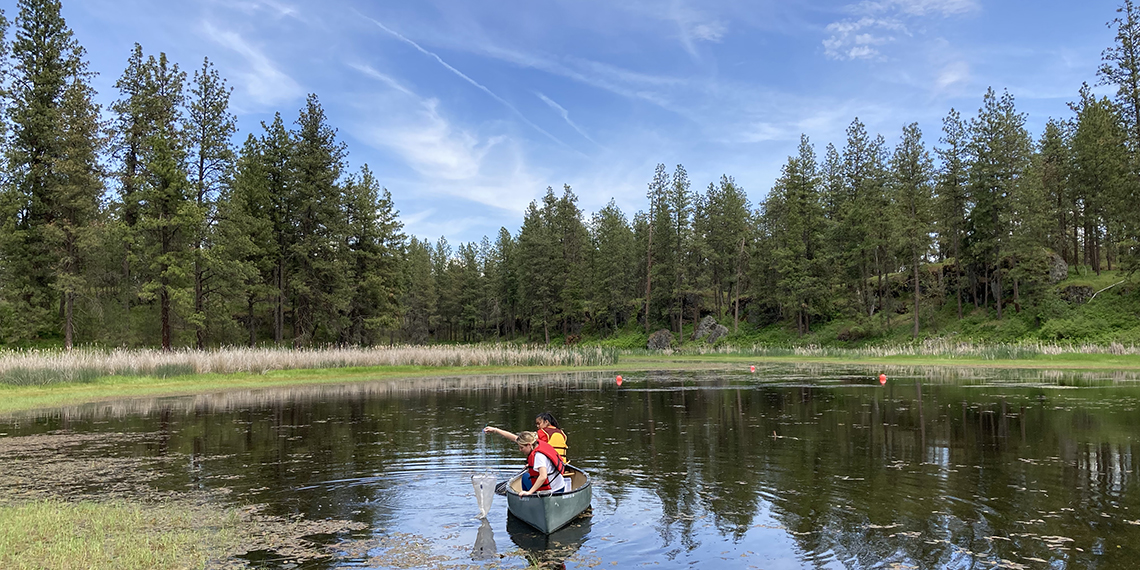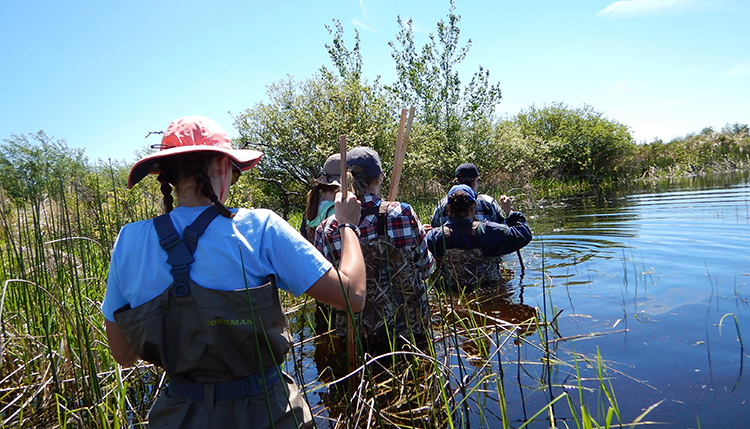What is the Future of Freshwater in the Pacific Northwest?

As climate change advances and causes ever-more-dramatic shifts to Earth’s ecosystems, studying the resiliency of different communities could be key to determining how successful humanity will be in adapting to a hotter world.
A new five-year collaboration among 91³Ô¹ÏÍø University, Oregon State University and Whitworth University funded by a grant from the National Science Foundation (NSF) will allow scientists and students to observe how biological communities in freshwater ponds in the Pacific Northwest respond to changing climate conditions. Which freshwater creatures change with the climate, and which others die so another can survive, could tell us a lot about the future.
The 91³Ô¹ÏÍø team led by biology and environmental studies and sciences professor Betsy Bancroft and collaborators will collect data in the field and conduct experiments in the lab to determine how resilient the life forms in ponds near Spokane, Moses Lake, Washington, and Corvallis, Oregon, are when their respective environments are stressed in different ways.
The GU award amount of the NSF grant is $858,888, which will fund research supplies and stipends for student and faculty researchers to work on the project four seasons per year for the next five years. It also supports outreach and recruitment efforts aimed at tribal and migrant communities, including the creation of bilingual children’s books highlighting Pacific Northwest freshwater systems. The project title is “URoL:EN – Rules of Resilience: Predicting Transformation of Emergent Freshwater Networks Under Variable Climate Regimes.” (URoL is a program at the National Science Foundation, while the EN stands for “Emerging Networks” — the particular part of the program Bancroft applied to for the grant).
“One of my goals for this grant was to be able to support high-quality undergraduate research experiences, because it’s so important for students. It’s life-changing for many,” Bancroft said.
“Giving them that experience is so transformational. No matter what they end up doing – if they go to medical school, if they go open their own business or anything else – the skills they learn in a lab and doing science helps them be better at that. And it helps make better citizens.”
Practically speaking, the project will help scientists and government officials understand what climate change will do to freshwater systems, and which of those systems might need to be managed to mitigate any negative effects. The idea evolved out of previous work Bancroft completed with one of her Oregon State cohorts, Tiffany Garcia, on “phenotypic plasticity.” - an organism’s ability to change something about itself, whether behavior or body shape or color.
“Amphibians are good at that,” Bancroft explained. “Tadpoles can change their development rate, they can change how big they are, they can do all kinds of cool things. That plasticity is important in that it allows organisms to be flexible and respond to changing environments. We started talking about how much that might contribute to how resilient a system is.”
The three types of ponds designated for field data have different characteristics despite being relatively close together. The researchers will look at ponds that never dry up, ponds that occasionally dry up, and those that always dry up, because the resident organisms have evolved to deal with those conditions. As climate change progresses, more ponds will dry up, but they’ll also refill rapidly when big storms occur. Basically, Bancroft said, all three types of ponds will be less stable as climate change advances. Looking at all of them every season for five years will provide valuable insights.
“We’ll get a really good picture of how these ponds change and respond to environmental conditions, and what they look like with year-to-year variation,” she said. “Stuff changes even without climate change, and it’s all speeding up right now. ”
The students will conduct experiments to compare what happens to species’ interactions as the climate shifts and they compete for ever-scarcer resources in their ecosystems. The students will look at how predator-prey interactions change, and how different communities in the ponds interact.
The 91³Ô¹ÏÍø students will bring samples gathered by themselves and Oregon State students into the labs at GU and conducting various experiments. Then the researchers will build artificial ponds at Oregon State to manipulate the environment and put different organisms under different stresses. That’s where Whitworth students come in; engineers from the Spokane school will design software and hardware to create the climate-change conditions the GU and OSU students will use for their experiments.
“At all of those stages, students from 91³Ô¹ÏÍø will be involved,” Bancroft said. “Our students can help do the field surveys here in Spokane, and they’re the ones leading the experiments here on campus.”

There will be four experiments conducted at GU each year of the grant – one each semester, and two every summer – and the students will also travel to Oregon State to help set up the artificial ponds and collect data there as well.
For Bancroft, having her 91³Ô¹ÏÍø students work alongside students from a large research-oriented institution like Oregon State is an incredible opportunity.
“Here at GU and other, smaller schools, we really get to know the students,” Bancroft says. “The students have a personal relationship and a personal connection to us and the university. It’s easier to get a high-quality research experience at a place like this than it is at a big institution. But our students don’t know what it’s like to be a grad student because they don’t interact with them. One of our goals for this project was to allow students who work very closely with me to get the experience of seeing what it’s like at a place where they would be if they go to graduate school.”
The fact Bancroft gets to do important research while helping students gain the experience of a lifetime is only buoyed by the fact their results could ultimately help all of us enjoy life on this planet, and playing in the water, a little longer.
“One of the reasons I work in freshwater is because freshwater is vitally important for everyone,” Bancroft said. “It’s relatively limited, so trying to understand how climate change is going to impact the systems we all depend on – whether it’s drinking water or just that people like to go have fun fishing, swimming in lakes, boating – is personally important to me.
“I have kids and I want them to have clean water. Freshwater is just so important. One of the things that freshwater ecosystems provide is the cleaning of water. Wetlands are like sponges, and they clean the water passing through and they soak up sediments and contaminants. So we really need to understand how to maintain these systems and keep them as healthy as possible.”
- Academics
- Careers & Outcomes
- Global Impact
- Student Life
- Sustainability
- College of Arts & Sciences
- Biology
- News Center




